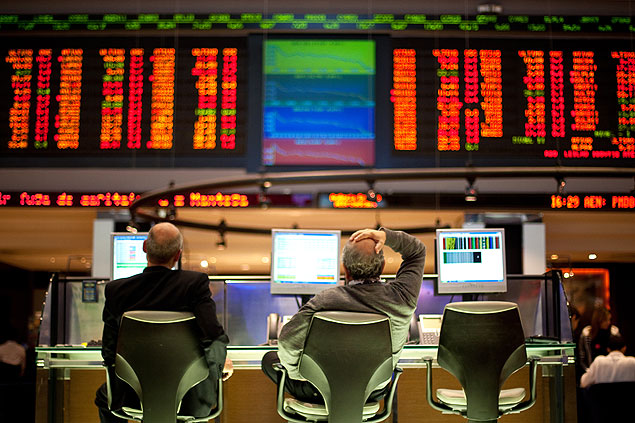Latest Photo Galleries
Brazilian Markets
16h39 Bovespa |
+0,71% | 125.088 |
16h43 Gold |
0,00% | 117 |
16h43 Dollar |
-0,99% | 5,1983 |
16h30 Euro |
+0,49% | 2,65250 |
ADVERTISING
Brazil Leads Decline Among World's Biggest Companies
03/10/2014 - 09h40
Advertising
ÁLVARO FAGUNDES
ASSISTANT EDITOR OF "MERCADO"
MARIANA BARBOSA
FROM SÃO PAULO
The losses of São Paulo's stock market and the decline of Brazil's real made Brazilian companies the biggest losers among the world's major companies, losing space among global giants.
Among the 10 companies of the world's top 500 that lost the most market value in the past 12 months, four are Brazilian. Market value is calculated according to the company's stock price multiplied by its total shares and reflects investors' trust in the company.
Petrobras had the worst results, losing 34% of its market value - a decline only topped by Spanish bank Bankia (51%), a sign of the crisis in Spain - the bank was saved from bankruptcy by the local government in 2012.
Five years ago, Petrobras was among the world's top ten companies, and has fallen to 121st, with a value of US$ 74 billion, one third of its rival PetroChina.
Growing debts, the government's order to maintain local fuel prices and the risk of stocks losing "investment rating" are the reasons that led investors to believe Petrobras is worth nearly US$ 100 billion less than the U.S.'s Amazon, which had profits of US$ 274 million last year, while Petrobras profited US$ 11 billion.
But Petrobras is not the only company to suffer on the stock market: Vale, Banco do Brasil and Bradesco are among the top ten losers, with losses of 25% to 30%.
The result is that currently there are only six Brazilian companies among the world's top 500, four less that at the same time in 2013 (Souza Cruz, Itaúsa, Santander and Telefônica fell from the ranking last year) and six in comparison with 2012 (OGX and Cielo also were on the list).
Andrew Campbell, an Equity Research strategist for Latin America at Credit Suisse, believes that the Brazilian companies' fall reflects the performance of the local stock market.
"The last year was especially bad for developing economies. While Brazil fell 26% [according to the IBr X 100, which measures 100 Brazilian stocks], developing countries declined 8%. In the same period, the U.S. stock market rose more than 22%."
Campbell believes the poor results reflect the low growth of the Brazilian economy (Credit Suisse forecasts G.D.P. growth of 1.8% this year, following a 2.3% rise in 2013) and the U.S's Central Bank withdrawal of part of the stimulus adopted in 2012, which has pressured developing economies' currencies.
With a 16% decline against the dollar, Brazil's real is the fourth currency (among 31) that most devalued in the last 12 months. As the ranking is measured in dollars, the exchange market fluctuations also have an impact on the list. "Not considering any other factor, companies lost 16%," said Campbell.
Translated by THOMAS MUELLO
Read the article in the original language
| Daniel Marenco - 4.ago.2011/Folhapress | ||
 |
||
| The losses of São Paulo's stock market made Brazilian companies the biggest losers among the world's major companies |



